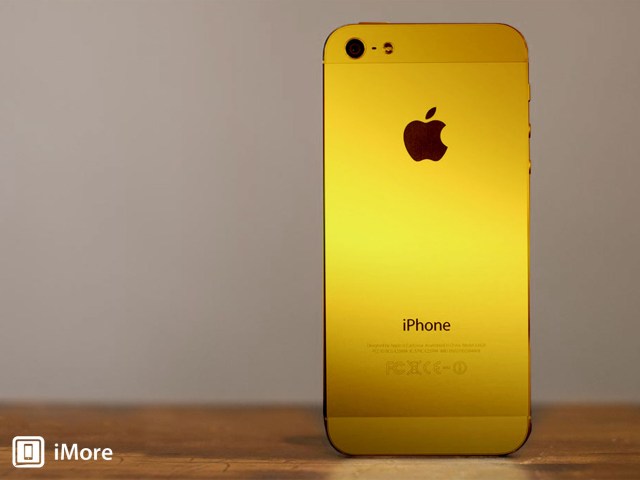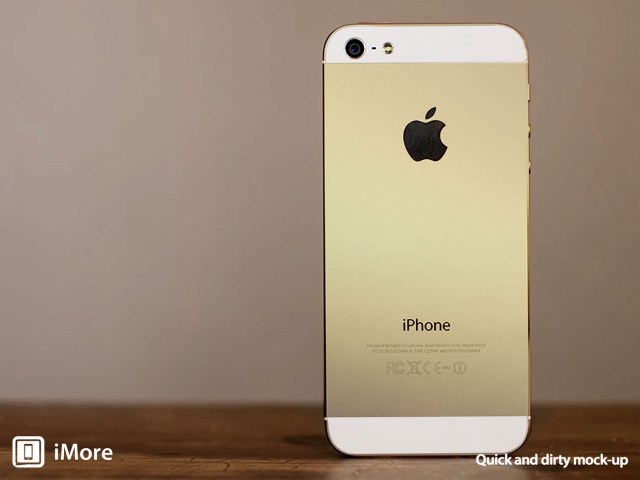“Gold? All over?†M asks James Bond upon hearing how Jill Masterson died in 1964′s Goldfinger. While Bond goes on to explain that the gold coating on Ms. Masterson caused her to die of “skin suffocationâ€, the same fate will not befall the next iPhone. But only because the iPhone will not require oxygen.
Yes, there will be a gold iPhone.
That’s the latest I’m hearing from multiple sources after several weeks of rumors and possible component leaks suggesting the same thing. At first, I couldn’t believe Apple would break from the tradition of offering the simple choice: black and white (or “slate†and “silver†if you prefer for the iPhone 5) for their flagship device. Gold simply seemed too gaudy, perhaps even tacky. But a few compelling arguments countered my disbelief. And now, upon checking, sure enough, there will be gold.
On Friday, Rene Ritchie of iMore, made the most compelling argument for the golden iPhone yet. After hearing from his own sources that the gold iPhone seemed to be real, Ritchie checked with his colleague Ally Kazmucha, who noted that gold would be one of the “easiest colors to anodize onto an iPhoneâ€. Much easier than say, black (which is likely why the current black iPhone 5 has more of a “slate†back color).
But simply doing something because it’s easy is not good enough â€" certainly not for Apple. Much more compelling is the argument that gold is one of the most popular after-market color adjustments for current iPhones (including gold cases). And gold has been in the midst of a renaissance in style after years of being banished to “gaudy and tacky†hell, as I noted above.
Perhaps most importantly, I’m told that the golden iPhone will not be a totally blinged-out gold. Originally, Ritchie included a mock-up on the top of his post that resembled an iPhone with a golden shell akin to a brick of gold bullion. I was told this image was inaccurate and that the actual gold iPhone would be much more subtle in color. Think: less “gold†and more “champagneâ€.
In other words, more like the old gold iPod mini. (Incidentally, this model of the iPod mini was the shortest-lived, presumably because it was less popular.) The gold tone also apparently shifts depending on how light is hitting it.
Ritchie actually said he heard the same feedback on his blinged-out golden iPhone and has since updated his mock-up to be far more subtle. Perhaps it will be more marketed along the lines of “champagne wishes and caviar dreams†â€" though I doubt it.
Anyway, I love the notion that this new iPhone (widely assumed to be called the “iPhone 5Sâ€, though it’s not clear if that’s set in stone yet) may have two distinctive new physical features: a gold color and a fingerprint scanner. Hence, the Goldfinger references.
On the topic of the fingerprint scanner, after hearing a number of whispers several months ago, there hasn’t been much recently. This may suggest that plans have been altered or, perhaps more likely, that Apple has successfully quashed the leaks of what would be the flagship new feature of the device. Rarely do code leaks lie, and this was a pretty substantial one a few weeks back.
While I initially wondered if such a fingerprint scanner would be used for payments as well as security and identification, I think this post by Geppy Parziale explains why that’s likely not in the cards, at least at first. Of course, fingerprint verification paired with the iCloud Keychain credit card sync feature in iOS 7 could be the first logical step.
Finally, I think one more reason why we’re seeing this golden iPhone now may be related to the rumored “iPhone 5C†device â€" that is, the lower-cost iPhone. While I have no concrete information about that device, there seems to be way too much smoke around it both existing and launching in several colors, for there not to be fire.
(I also wonder if the recent push by Apple to sell more iPhones from their own Apple Stores has to do with the strategy for the iPhone 5C roll-out.)
On his The Talk Show podcast this past week, John Gruber and I talked a bit about how Apple might differentiate the rumored iPhone 5S from the rumored iPhone 5C. Beyond speed and price, color seems likely to be a key differentiator. It’s entirely possible that Apple decided to keep the focus on white and black (again, silver and slate) for the high-end model, while choosing more playful colors for the lower end. But some people, bored of black and white, may have opted for the 5C simply to add some color to their iLives. So the gold iPhone 5S (with a white front plate, one would assume) would seem to be a decent compromise in that scenario.
Also, of course, a gold option may serve to placate some of those who feel an iPhone 5S isn’t enough of an upgrade from the iPhone 5 simply because it largely looks the same.
Or perhaps those making such calls at Apple are simply more Johan van der Smut, aka Goldmember, than Auric Goldfinger. “I love goooooold!â€
Update: A number of folks have noted that a gold iPhone would likely do well in the Chinese and Indian markets as well, where the color is very popular. This is especially interesting given the talk about the “iPhone 5C†being key in these markets as well, with a presumed unsubsidized lower price-point. One line of thinking was that the lower-cost iPhone would all-but replace the higher cost one in these markets. But perhaps the gold option would still be enticing enough for some buyers to lure them to the higher end model. That’s all pure speculation, of course.
Another thought: given Apple’s recent push to play up their California affiliation (the new OS X naming scheme, the “Designed by Apple in California†ad campaign, etc) maybe the gold iPhone could continue this trend. California is, after all, “the Golden Stateâ€.
Less this:

More this:

[images: MGM and iMore]
April 1, 1976
NASDAQ:AAPL
Started by Steve Jobs, Steve Wozniak, and Ronald Wayne, Apple has expanded from computers to consumer electronics over the last 30 years, officially changing their name from Apple Computer, Inc. to Apple, Inc. in January 2007. Among the key offerings from Apple’s product line are: Pro line laptops (MacBook Pro) and desktops (Mac Pro), consumer line laptops (MacBook Air) and desktops (iMac), servers (Xserve), Apple TV, the Mac OS X and Mac OS X Server operating systems, the iPod, the...
No comments:
Post a Comment